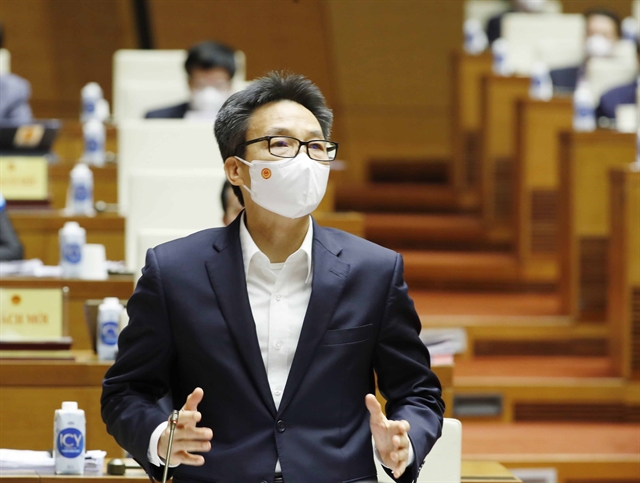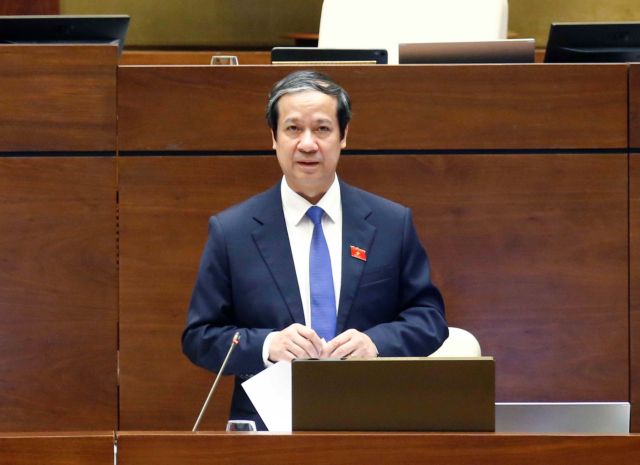 Society
Society


|
| Deputy Prime Minister Vũ Đức Đam speaks at the session on Thursday. — VNA/VNS Photo |
HÀ NỘI — Deputy Prime Minister Vũ Đức Đam proposed the Ministry of Labour, Invalids and Social Affairs and localities to design more support packages to attract workers who had left for their hometowns to return to work during the Q&A session of the National Assembly on social affairs on Thursday.
He stressed that the pandemic has revealed many issues, particularly issues that existing for a long time relating to accommodation for workers and social welfare.
There were two main things that need to be addressed to help attract workers back to work, including controlling the pandemic to ensure safety for workers and reopening schools as many workers have children of school age, according to Đam. For the long-term, workers must be guaranteed part of their salaries in case of a further COVID-19 outbreak.
He also suggested reviewing all COVID-19 prevention and control regulations to ensure safety at businesses, particularly testing and dealing with F0 and F1 cases flexibly.
“Coordination of businesses is needed. Businesses need to take care of their own workers, not only depending on authorities,” he said.
Quality of online learning discussed
Ensuring the quality of online learning and its impacts on health, psychology of students and teachers were among issues raised by NA deputies during a Q&A session with Minister of Education and Training Nguyễn Kim Sơn the same day.

|
| Minister of Education and Training Nguyễn Kim Sơn is the third minister to take on the Q&A session. — VNA/VNS Photo |
According to the minister, the COVID-19 pandemic has interrupted national educational plans with nearly 20 million students across the country having to suspend classes, while more than 70,000 university students have not been able to graduate on time, affecting the labour force.
Online learning amid a lack of infrastructure has caused a series of negative impacts, making students stressed and putting more pressure on teachers, he said.
With the spirit of “Stop going to school, but don’t stop learning”, the education sector has applied flexible teaching and learning methods, trying to minimise impacts of the pandemic and maintain educational quality, he said.
The sector has assessed initial impacts of COVID-19 on education. Some adverse impacts have been shown through statistics but there are many other long-term and unmeasurable effects, especially gaps in knowledge, psychological, mental and emotional impacts on students.
Deputy Nguyễn Thị Quyên Thanh from Vĩnh Long Province asked the minister about solutions to ensure online learning quality and as well as stabilise health and psychology of students and teachers in the long run, given that distance learning will be a long-term solution when the pandemic continues.
Minister Sơn said the pandemic helped us realise the strength and belief in the educational system thanks to the enthusiasm, dedication and sacrifice of nearly one million teachers and educational administrators, citing creative solutions of teachers in the pandemic.
“We conducted tests to detect the virus but the virus itself tests our whole system,” he said.
He admitted limitations in a lot of documents and policies, saying that the ministry will continue to conduct reviews to address these problems.
The pandemic also shows that skills of teachers in management and of students, as well as students' self-study ability need to be enhanced, he said.
Online learning is being applied in about 350 districts and towns nationwide while classes are still open in 316 other administrative units. Sơn said the ministry would have specific solutions to improve educational quality for three groups of localities – provinces and cities in the northern and central regions running in-class learning; some localities about to reopen schools and other localities continuing distance learning.
Switching to online learning in the pandemic is done worldwide. The education sector has gained experience in the previous pandemic waves but the prolonged outbreak this year led to an unprecedentedly long time for online learning. Many teachers and students faced a lot of difficulties accessing the internet, he said.
He cited more than 1.86 million students not having equipment to start online lessons. In many families, two or three siblings share a phone to study.
The minister proposed local authorities offer equipment support for the children, saying: “Some students are dropping out of school because they lack equipment. This is a more pressing issue before we judge what the children have learned.”
Deputy Trần Văn Tuấn from Bắc Giang Province asked for the minister’s comment on the fact that soft skills training is not paid attention to in schools.
Minister Sơn admitted that online learning had affected quality of soft skills training as soft skills can only be taught through face-to-face interaction.
He said when schools reopen, it is necessary to improve soft skills training along with academic lessons, requiring collaboration of families and schools with a high responsibility put on the students’ parents.
Responding to a question from deputy Hoàng Văn Liên from Long An Province on a large number of unemployed graduates, causing waste to human resources as training quality at universities does not meet social demand, minister Sơn said there were a lot of tasks to help graduates find jobs and more importantly, find quality jobs.
The relations between supply and demand, training reality and demand of the labour market must be taken into consideration. Another important factor is the connection between schools and businesses. At the same time, the quality of training is also a factor that needs attention.
"Inaccurate forecast for human resource demand and irrelevant training with the forecast will lead to the shortage of labourers in one field and surplus in other fields. Therefore, forecasting in parallel with improving the quality of training and enhancing skills for students are important,” he said.
Later the same day, NA deputies questioned Minister of Trade and Investment Nguyễn Chí Dũng about issues relating to the implementation of support packages; building GDP targets; measures to speed up disbursement of public investment and ODA capital as well as priorities to invest in disadvantaged areas. — VNS




